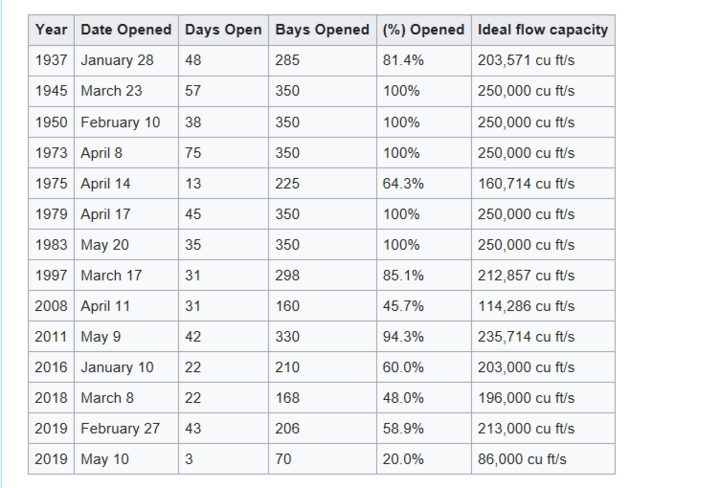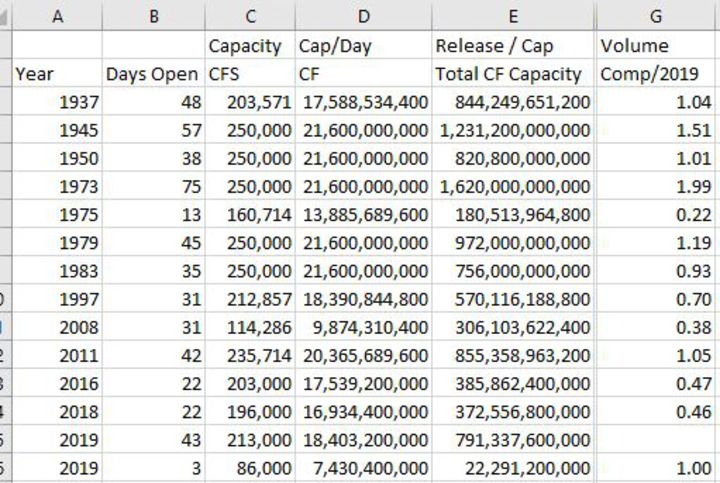john in la
Well-known Member
After changing my paper mill stench post into a climate change post you guys seem to be itching for one.
So here you go.
How can we measure excessive rainfall and is it becoming more common.
On a local level we can see excessive rain from water in the fields or tractor tire ruts.
On a regional level we can see excessive rain from the river coming out of its banks and flooding our town.
But on a national level if we want to see excessive rain we need to look at the Mississippi river water shed as this river drains most of our nation.
So what has the Mississippi river been doing of late.
The easiest way to see that is to look at my area.
We utilize spillways to control the river and deal with excessive water.
A little background info.
The river in New Orleans will handle 1.25 million cubic feet per second (CFS) of flow and yes that is a lot of water.
A spillway just north of New Orleans will handle 250,000 CFS. So now we are at 1.5 million CFS.
A second spillway farther north where the Red and Mississippi join will handle another 1.5 million CFS.
This second spillway has only been partially open twice since it was built.
They thought they would have to use it this year but never did.
So we can conclude for the river to surpass 1.5 million CFS is rare but has happened.
But lets look at this smaller spillway.
It has been used 14 times in 13 years since it was built in 1930.
Here is a list of the openings.

So lets look at this information.
This year 2019 is historic in it is the first year the spillway has ever been opened two years in a row. It is the first year they had to use this spillway twice in one year. And this year is the longest duration of days opened. It opened for the second time on May 10th and is still open today.
Looking a little deeper you will notice the spillway was used 8 years from 1930 to 2007.
That is once every 9.6 years.
But from 2011 to 2019 it has been used in 4 years or once every 2 years.
So while I will let you guys debate and argue if this is just a natural cycle or man made it would seem to even the most closed minded person that something is happening to our climate.
I look at it more from the point of what happens to the American farmer if he has 2 years in a row like this year where he can not even get into the field to plant a crop.
What happens to the USA as a country if our obese population is suddenly shopping at a grocery with bare shelves because there was no crop grown.
So here you go.
How can we measure excessive rainfall and is it becoming more common.
On a local level we can see excessive rain from water in the fields or tractor tire ruts.
On a regional level we can see excessive rain from the river coming out of its banks and flooding our town.
But on a national level if we want to see excessive rain we need to look at the Mississippi river water shed as this river drains most of our nation.
So what has the Mississippi river been doing of late.
The easiest way to see that is to look at my area.
We utilize spillways to control the river and deal with excessive water.
A little background info.
The river in New Orleans will handle 1.25 million cubic feet per second (CFS) of flow and yes that is a lot of water.
A spillway just north of New Orleans will handle 250,000 CFS. So now we are at 1.5 million CFS.
A second spillway farther north where the Red and Mississippi join will handle another 1.5 million CFS.
This second spillway has only been partially open twice since it was built.
They thought they would have to use it this year but never did.
So we can conclude for the river to surpass 1.5 million CFS is rare but has happened.
But lets look at this smaller spillway.
It has been used 14 times in 13 years since it was built in 1930.
Here is a list of the openings.

So lets look at this information.
This year 2019 is historic in it is the first year the spillway has ever been opened two years in a row. It is the first year they had to use this spillway twice in one year. And this year is the longest duration of days opened. It opened for the second time on May 10th and is still open today.
Looking a little deeper you will notice the spillway was used 8 years from 1930 to 2007.
That is once every 9.6 years.
But from 2011 to 2019 it has been used in 4 years or once every 2 years.
So while I will let you guys debate and argue if this is just a natural cycle or man made it would seem to even the most closed minded person that something is happening to our climate.
I look at it more from the point of what happens to the American farmer if he has 2 years in a row like this year where he can not even get into the field to plant a crop.
What happens to the USA as a country if our obese population is suddenly shopping at a grocery with bare shelves because there was no crop grown.


